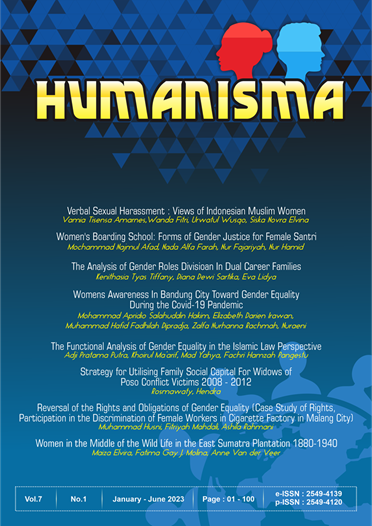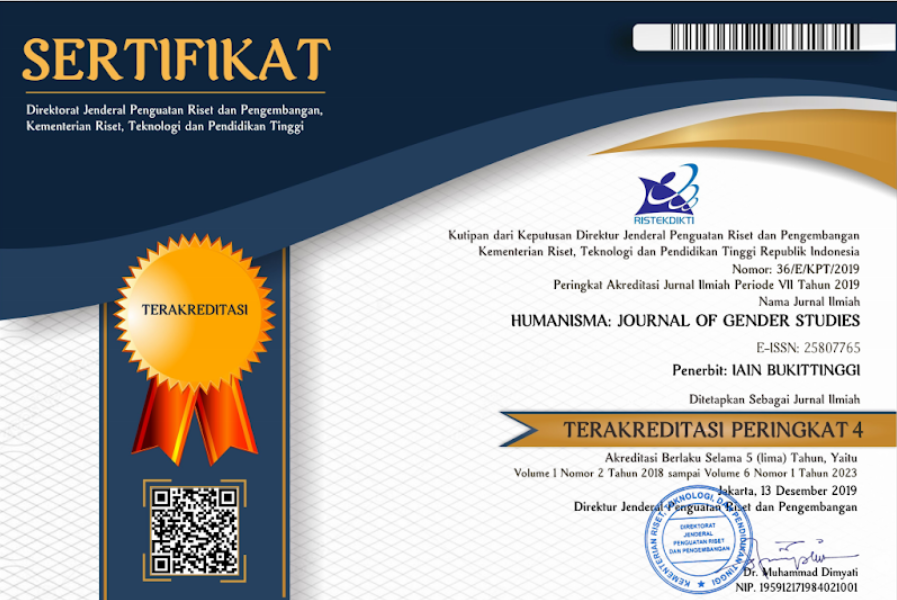Strategy for Utilising Family Social Capital For Widows of Poso Conflict Victims 2008 - 2012
DOI:
https://doi.org/10.30983/humanisme.v7i1.6349Keywords:
Conflict, Capital, Adaptation, Social Welfare,Abstract
This study aims to reveal the ways in which widows of conflict victims manage their assets and their abilities in an effort to survive and improve social welfare after the Poso conflict. Data were obtained from two sources: an analysis of literature during the Poso conflict and interviews with victims and their relatives. The results of the study show that widows in desperate situations save their lives from threats and riots by utilising social capital by relying on relatives with ownership. Assets and capabilities are linked by access and property ownership. This was built before the conflict occurred so as to strengthen the bonds of post-conflict social capital with kinship strength among the closest relatives, such as parents, siblings, and nephews or nieces, based on the same religion, for their survival.
References
Journal
Asquith, Linda, ‘Bourdieu and Social Capital’, in Rebuilding Lives After Genocide Migration, Adaptation and Acculturation, 1st edn (New York: Palgrave Macmillan Cham, 2019), pp. 27–45 <https://doi.org/https://doi.org/10.1007/978-3-030-14074-8>
Baczko, Adam, and Gilles Dorronsoro, ‘Thinking about Civil Wars with and beyond Bourdieu: State, Capital and Habitus in Critical Contexts’, Journal of Classical Sociology, 22.2 (2021), 199–221 https://doi.org/10.1177/1468795X211002688
Blackburn, Susan, ‘The Impact of Armed Conflict on Widowhood: Case Studies from Sri Lanka, Cambodia and East Timor’, Asian Journal of Women’s Studies, 16.4 (2010), 60–90 <https://doi.org/10.1080/12259276.2010.11666098>
Bokek-Cohen, Ya’arit, and Smadar Ben-Asher, ‘The Double Exclusion of Bedouin War Widows’, International Journal on Minority and Group Rights, 25.1 (2018), 112–31 <https://www.jstor.org/stable/27072314>
Bourdieu, Pierre, and Loïc Wacquant, ‘Symbolic Capital and Social Classes’, Journal of Classical Sociology, 13.2 (2013), 292–302 <https://doi.org/10.1177/1468795X12468736>
Berry, Marie E, ‘War, Women, and Power’, in War, Women, and Power: From Violence to Mobilization in Rwanda and Bosnia-Herzegovina (Cambridge University Press, 2018), pp. 1–27 <https://doi.org/10.1017/9781108236003.001>
Bourdieu, Pierre, ‘Cultural Reproduction and Social Reproduction’, in Knowledge, Education, and Cultural Change, ed. by Richard Brown, 1st edn (London: Routledge, 2018), pp. 71–112 <https://doi.org/https://doi.org/10.4324/9781351018142>
———, The Field of Cultural Production, ed. by Randal Jhonson (United States: Columbia University Press, 1993)
———, ‘The Forms of Capital’, in The Sociology of Economic Life, ed. by Granovette Mark and Swedberg Richard, 1st edn (New York: Greenwood Press., 2011), pp. 78–92 <https://doi.org/https://doi.org/10.4324/9780429494338>
Carpenter, R Charli, ‘Women , Children and Other Vulnerable Groups ": Gender , Strategic Frames and the Protection of Civilians as a Transnational’, 49.2 (2005), 295–334 <https://www.jstor.org/stable/3693516>
Cerrato, Javier, and Eva Cifre, ‘Gender Inequality in Household Chores and Work-Family Conflict’, Frontiers in Psychology, 9.AUG (2018), 1–11 <https://doi.org/10.3389/fpsyg.2018.01330>
Chung, Heejung, and Tanja van der Lippe, ‘Flexible Working, Work–Life Balance, and Gender Equality: Introduction’, Social Indicators Research, 151.2 (2020), 365–81 <https://doi.org/10.1007/s11205-018-2025-x>
Coleman, James S, ‘Social Capital in the Creation of Human Capital’, American Journal of Sociology, 94 (1988), S95–120 <http://www.jstor.org/stable/2780243>
Collins, Tracy, ‘Managing Widowhood in Later Life: The Challenges Encountered’, International Journal of Therapy and Rehabilitation, 21 (2014), 69–76 <https://doi.org/10.12968/ijtr.2014.21.2.69>
Cox, Carole, and Manoj Pardasani, ‘Aging and Human Rights: A Rights-Based Approach to Social Work with Older Adults’, Journal of Human Rights and Social Work, 2.3 (2017), 98–106 <https://doi.org/10.1007/s41134-017-0037-0>
Dasgupta, Pritha, ‘Women Alone: The Problems and Challenges of Widows in India’, International Journal of Humanities and Social Sciences (IJHSS), 6.6 (2017), 35–40
Dube, Misheck, ‘Isolation and Its Impact on Widows: Insights from Low-Resourced Communities in Binga District, Zimbabwe’, Social Sciences, 11.7 (2022) <https://doi.org/10.3390/socsci11070298>
Fitri, Wanda, ‘Women and Deradicalism: Understanding the Women’S Role in Developing Peaceful Culture’, HUMANISMA : Journal of Gender Studies, 3.1 (2019), 50–57 <https://doi.org/10.30983/humanisme.v3i1.1416>
Gizelis, Theodora-Ismene, ‘Systematic Study of Gender, Conflict, and Peace’, Peace Economics, Peace Science and Public Policy, 24.4 (2018), 1–10 <https://doi.org/doi:10.1515/peps-2018-0038>
Gunawardane, Chamalie, ‘Continuities and Discontinuities of Life of Military War Widows in the Post- War Sri Lankan Society’, American Scientific Research Journal for Engineering, Technology, and Sciences (ASRJETS), (2017), 171–90
Houston, Stan, ‘Extending Bourdieu for Critical Social Work’, in The Routledge Handbook of Critical Social Work, ed. by Stephen Webb, 1st edn (London: Routledge, 2019) <https://doi.org/https://doi.org/10.4324/9781351264402>
Hutchison, Margaret, and Emily Robertson, ‘Introduction: Art, War, and Truth – Images of Conflict’, Journal of War and Culture Studies, 8.2 (2015), 103–8 <https://doi.org/10.1179/1752627215Z.00000000065>
Jaspal, Rusi, Kevin Carriere, and Fathali Moghaddam, ‘Bridging Micro, Meso, and Macro Processes in Social Psychology’, in Psychology as the Science of Human Being, ed. by Jaan Valsiner, Giuseppina Marsico, Nandita Chaudhary, Tatsuya Sato, and Virginia Dazzani, 1st edn (Switzerland: Springer International, 2016), pp. 265–76 <https://doi.org/10.1007/978-3-319-21094-0_15>
Kelly, Paul, Conflict, War and Revolution The Problem of Politics in International Political Thought, 1st edn (London: LSE Press, 2022) <https://doi.org/https://doi.org/10.31389/lsepress.cwr>
Kenen, Regina, ‘Uncoupled: American Widows in Times of Uncertainty and Ambiguous Norms’, Journal of Contemporary Ethnography, 50.4 (2021), 550–79 <https://doi.org/10.1177/0891241621996801>
McRae, David Gregory, ‘Criminal Justice and Communal Conflict: A Case Study of the Trial of Fabianus Tibo, Dominggus Da Silva, and Marinus Riwu’, Indonesia, 83 (2007), 79–117 <https://www.jstor.org/stable/40376414%0A>
Mir, Afaq Ahmad, Zaraq Jahan, and Rayees Ahmad, ‘Lived Experiences of Widows of Armed Conflict in Kashmir: A Qualitative Study’, OMEGA - Journal of Death and Dying, (2022), 00302228211072965 <https://doi.org/10.1177/00302228211072965>
Moser, Caroline O N, ‘The Asset Vulnerability Framework: Reassessing Urban Poverty Reduction Strategies’, World Development, 26.1 (1998), 1–19 <https://doi.org/https://doi.org/10.1016/S0305-750X(97)10015-8>
Radzilani-Makatu, Makondelele, ‘Multiple Losses and Gains: Tshivenda-Speaking Widows’ Accounts in the Context of the Death of a Husband’, Journal Of Sociology And Social Anthropology, 6 (2015), 493–500 <https://doi.org/10.31901/24566764.2015/06.04.06>
Rismawati, ‘Bertahan Hidup Di Pengungsian Kaum Janda Korban Konflik Poso’, Academica, 3.1 (2011), 593–610 <https://www.neliti.com/id/publications/28534/bertahan-hidup-di-pengungsian-kaum-janda-korban-konflik-poso>
Strandh, Veronica, and Benni Yusriza, ‘War Widows’ Everyday Understandings of Peace in Aceh, Indonesia’, Journal of Peacebuilding & Development, 16.1 (2021), 102–6 <https://doi.org/10.1177/1542316620981834>
Subagya, Y. Tri, ‘Women Stories Of The Violent Conflict In Poso And Trauma Healing’, International Journal of Humanity Studies, 2.1 (2018), 101–13 https://doi.org/https://doi.org/10.24071/ijhs.2018.020111
Suyito, Suyito, Redni Putri Meldianto, Siti Annisa, and Tesi Prima, ‘Penguatan Kapasitas Perempuan Sebagai Steakholder Dalam Penanggulangan Korban Bencana Banjir Di Pangkalan’, HUMANISMA : Journal of Gender Studies, 3.2 (2019), 141–53 <https://doi.org/10.30983/humanisme.v3i2.2406>
Upali, Pannilage, and Chamalie Gunawardena, ‘Military War Widows in Post-War Sri Lanka’, Journal of Conflict, Peace and Development Studies, 2 (2016), 1–12 <https://www.researchgate.net/publication/316507373_Military_War_Widows_in_Post-war_Sri_Lanka>
Wang, H M, A L Ma, and T T Guo, ‘Gender Concept, Work Pressure, and Work–Family Conflict’, American Journal of Men’s Health, 14.5 (2020) <https://doi.org/10.1177/1557988320957522>
Wichitra, Yasya, ‘Gender Analysis of Communal Conflicts in Indonesia’, Malaysian Journal of Social Sciences and Humanities, 3.1 (2018), 25–35 <https://media.neliti.com/media/publications/322517-gender-analysis-of-communal-conflicts-in-c4a51f61.pdf>
Yadav, Punam, ‘Can Women Benefit from War? Women’s Agency in Conflict and Post-Conflict Societies’, Journal of Peace Research, 58.3 (2020), 449–61 <https://doi.org/10.1177/0022343320905619>
Books
Badan Pusat Statistik, Kabupaten Poso, Kecamatan Lage Dalam Angka, 1st edn (Poso: Badan Pusat Statistik, Kabupaten Poso, 2012)
Coleman, James S., Foundations of Social Theory, 1st edn (Cambridge: Harvard University Press, 1990)
Dina, Afrianty, Women and Sharia Law in Northern Indonesia Local Women’s NGOs and the Reform of Islamic Law in Aceh, 1st edn (New York: Routledge Taylor & Francis Group, 2015)
Gogali, Lian, Konflik Poso, Suara Perempuan Dan Anak Menuju Rekonsiliasi Ingatan, ed. by Kunto AA, 1st edn (Yogyakarta: Galang Press, 2009)
Kementerian PPN/BAPPENAS, Republik Indonesia, Australia Indonesia Partnership Knowledge Sector Initiative, and Australian Government, Gender Equality, Disability and Social Inclusion in Practice Research and Advocacy Experience of Knowledge Sector Initiative Partners (Jakarta, 2022) <https://www.ksi-indonesia.org/assets/uploads/original/2022/03/ksi-1646708612.pdf>
Komnas Perempuan, Special Rapporteur for Poso : Women Ensnared By Impunity : Violence & Intervention. (Jakarta, 2009) <https://www.ohchr.org/sites/default/files/lib-docs/HRBodies/UPR/Documents/session13/ID/Komnas_Perempuan_UPR_IDN_S13_2012_KomnasPerempuan_Annex7_E.pdf>
Skjelsboek, Inger, and Dan Smith, Gender, Peace and Conflict, ed. by Inger Skjelsboek and Dan Smith, 1st edn (London: Sage Publication, 2001) <https://doi.org/10.4135/9781446220290>
Wacquant, Loic J. D, and Pierre Bourdieu, ‘An Invitation to Reflexive Sociology’, in An Invitation to Reflexive Sociology, ed. by Loic D Wacquant and Pierre Bourdieu (Chicago IL: University of Chicago Press, 1992)
Online Reference and Interview
Research team, Personal Interview, January – July 2018
Thomas-Greenfield, Linda, Xavier Biang, Michel, Nebenzia, Vassily A., ‘Ninety Per Cent of War-Time Casualties Are Civilians, Speakers Stress, Pressing Security Council to Fulfil Responsibility, Protect Innocent People in Conflicts’, United Nations, 2022, pp. 1–3 <https://press.un.org/en/2022/sc14904.doc.htm> [accessed 13 July 2023]
Downloads
Submitted
Accepted
Published
Issue
Section
License
Authors who publish with this journal agree to the following terms:
- Authors retain copyright and grant the journal right of first publication with the work simultaneously licensed under a Creative Commons Attribution-ShareAlike 4.0. that allows others to share the work with an acknowledgment of the work's authorship and initial publication in this journal.
- Authors are able to enter into separate, additional contractual arrangements for the non-exclusive distribution of the journal's published version of the work (e.g., post it to an institutional repository or publish it in a book), with an acknowledgment of its initial publication in this journal.
- Authors are permitted and encouraged to post their work online (e.g., in institutional repositories or on their website) prior to and during the submission process, as it can lead to productive exchanges, as well as earlier and greater citation of published work (See The Effect of Open Access).



















